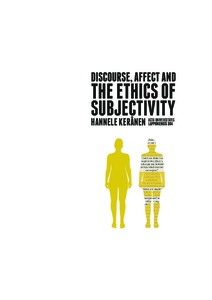Discourse, affect and the ethics of subjectivity
Keränen, Hannele (2018)
Keränen, Hannele
Lapin yliopisto
2018
ISBN:978-952-337-118-7
openAccess
Julkaisun pysyvä osoite on
https://urn.fi/URN:ISBN:978-952-337-118-7
https://urn.fi/URN:ISBN:978-952-337-118-7
Kuvaus
ei tietoa saavutettavuudesta
Tiivistelmä
This research focuses on the ethics of subjectivity in the changing landscape of higher education. Prior research provides knowledge on the production of subjectivity in higher education but there is little research on ethical subjectivity. Furthermore, empirical accounts on how affective and embodied experiences implicate the ethics of subjectivity are rare. By examining the relationship between ethics and affect, I offer a more nuanced understanding of how our self-production is bound to affective and embodied experiences.
My research builds on auto-ethnography; I examine the becoming of subjects in a merged Finnish University of Applied Sciences during the course of five years from a middle management position. The data consists of discussion notes and documents, tape-recordings from management meetings and recordings from info sessions. The data also consists of awkward encounters, which have produced the experience of difference at the level of subjectivity. With the archaeological and genealogical analyses, I elaborate on how we mobilise and resist discourses in our self-production. I also elaborate on how we produce ourselves as ethical subjects through the technologies of the self. Through a post-coding analysis I show how the becoming of subjects is bound to affective and embodied xperiences.
The results of my research produce new knowledge on the relationship between ethics and affect in our self-production. I argue that affective dissonance is central in reflecting our ways of becoming an ethical subject. It is also central in re-evaluating our self-relation. Theoretically, my dissertation adds to the discussion of ethical subjectivity through elaborating on how affective dissonance unfolds the ethics of subjectivity. Affective sensations are thus part of the experiences that we embody in various situations, and through which we orient ourselves as ethical subjects. Methodologically, this study acknowledges the importance of auto-ethnography in studying the relationship between ethics and affect and in our self-production.
Practically, I elaborate on how securing a smooth transition while promoting a strategic change can lead to contradictions. Because of these contradictions, the polyphony of truth claims and the ethical demands of the other are distanced rather than welcomed.The majority of the projects propagated under the umbrella of structural development of the Finnish higher education are carried out as projects of rationalisation without pausing to think about the distinctiveness of higher education institutions. This pausing would provide an opportunity to reflect the opportunities to harness an ethic of recognition. Such ethics does not manifest the ethical righteousness of those promoting change or those resisting it, but rather acknowledges our capacity to be critical and open to the demands of the other.
My research builds on auto-ethnography; I examine the becoming of subjects in a merged Finnish University of Applied Sciences during the course of five years from a middle management position. The data consists of discussion notes and documents, tape-recordings from management meetings and recordings from info sessions. The data also consists of awkward encounters, which have produced the experience of difference at the level of subjectivity. With the archaeological and genealogical analyses, I elaborate on how we mobilise and resist discourses in our self-production. I also elaborate on how we produce ourselves as ethical subjects through the technologies of the self. Through a post-coding analysis I show how the becoming of subjects is bound to affective and embodied xperiences.
The results of my research produce new knowledge on the relationship between ethics and affect in our self-production. I argue that affective dissonance is central in reflecting our ways of becoming an ethical subject. It is also central in re-evaluating our self-relation. Theoretically, my dissertation adds to the discussion of ethical subjectivity through elaborating on how affective dissonance unfolds the ethics of subjectivity. Affective sensations are thus part of the experiences that we embody in various situations, and through which we orient ourselves as ethical subjects. Methodologically, this study acknowledges the importance of auto-ethnography in studying the relationship between ethics and affect and in our self-production.
Practically, I elaborate on how securing a smooth transition while promoting a strategic change can lead to contradictions. Because of these contradictions, the polyphony of truth claims and the ethical demands of the other are distanced rather than welcomed.The majority of the projects propagated under the umbrella of structural development of the Finnish higher education are carried out as projects of rationalisation without pausing to think about the distinctiveness of higher education institutions. This pausing would provide an opportunity to reflect the opportunities to harness an ethic of recognition. Such ethics does not manifest the ethical righteousness of those promoting change or those resisting it, but rather acknowledges our capacity to be critical and open to the demands of the other.
Kokoelmat
- Väitöskirjat [421]
